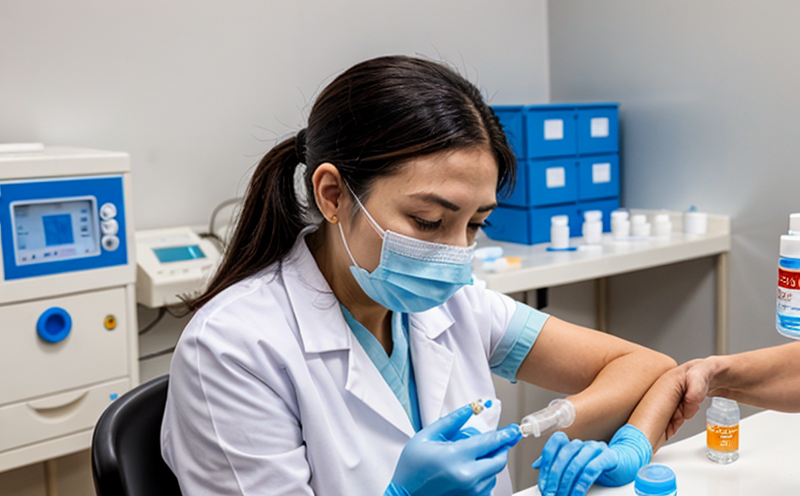Glycosylation Profiling of Vaccine Antigens Testing
The glycosylation profile of vaccine antigens is a critical parameter that can influence both the efficacy and safety profile of vaccines. Glycosylation, the process by which sugar molecules are attached to proteins or lipids, plays an essential role in determining how well a vaccine antigen interacts with the immune system. Accurate characterization of this process is vital for ensuring consistency, quality, and regulatory compliance.
At our laboratory, we use advanced mass spectrometry techniques combined with carbohydrate chemistry expertise to provide comprehensive glycosylation profiling services tailored specifically for vaccine antigens. Our approach involves a multi-step workflow that includes sample preparation, purification, digestion, and analysis using high-resolution mass spectrometers equipped with orthogonal ionization methods (e.g., ESI, APCI). This ensures precise identification of even minor variations in the glycan structures present on the antigen.
The results from our glycosylation profiling studies are typically presented as detailed reports that include quantitative data regarding the distribution and abundance of different types of glycans attached to the vaccine antigen. These insights help pharmaceutical companies optimize their manufacturing processes, enhance product quality, and ensure adherence to relevant international standards such as those specified in ISO 14648:2017.
To further support our clients' needs, we offer custom analytical solutions designed around specific research goals or regulatory requirements. For instance, some customers may require additional characterization beyond just the basic glycan composition; they might also want to explore how certain modifications affect immunogenicity or stability properties of their vaccines. In such cases, our team works closely with researchers to develop bespoke protocols that address these unique challenges.
Our commitment to excellence extends not only into technical expertise but also in terms of delivering timely and reliable results. With state-of-the-art instrumentation supported by experienced scientists who stay up-to-date on the latest developments within this rapidly evolving field, we ensure every project receives personalized attention from start to finish.
Applied Standards
The analysis of glycosylation profiles in vaccine antigens adheres closely to several key international standards which provide guidance on best practices and acceptable limits for various aspects of carbohydrate structure. Among these are:
- ISO 14648:2017 – General requirements for vaccines; quality assurance systems in the manufacture, distribution and marketing of vaccines.
- American Society for Testing Materials (ASTM) F3959-19 – Practice for Reporting Glycosylation Profiles from Mass Spectrometry Analysis of Vaccines.
These standards help ensure that all tests conducted meet industry-wide expectations regarding accuracy, precision, and reproducibility. By following these guidelines, we can provide robust data that supports informed decision-making throughout the development cycle of vaccines.
Environmental and Sustainability Contributions
In addition to providing high-quality scientific services, our laboratory is committed to minimizing its environmental impact through sustainable practices. We employ energy-efficient equipment whenever possible, minimize waste generation during sample preparation steps, and recycle used reagents where appropriate. Our commitment also extends to responsible handling of hazardous materials by adhering strictly to local regulations.
By integrating these principles into daily operations, we contribute positively towards reducing our carbon footprint while maintaining the highest standards of scientific integrity. This approach aligns with broader industry efforts aimed at fostering more sustainable approaches across all phases of vaccine production and distribution.
Use Cases and Application Examples
| Use Case | Description |
|---|---|
| Vaccine Development | Identifying optimal glycosylation patterns for improved immune responses. |
| Process Optimization | Monitoring changes in manufacturing conditions that affect glycan structures. |
| Quality Control | Detecting deviations from approved specifications during production runs. |
- Pharmaceutical companies can use our service to enhance the design and optimization of their vaccine candidates by identifying ideal glycosylation patterns that promote stronger immune responses.
- Manufacturers benefit from continuous monitoring of their processes via regular assessments of how variations in manufacturing parameters influence the final product's glycan profile.
- Regulatory bodies gain confidence when faced with consistent, high-quality data supporting compliance with stringent regulatory requirements.





